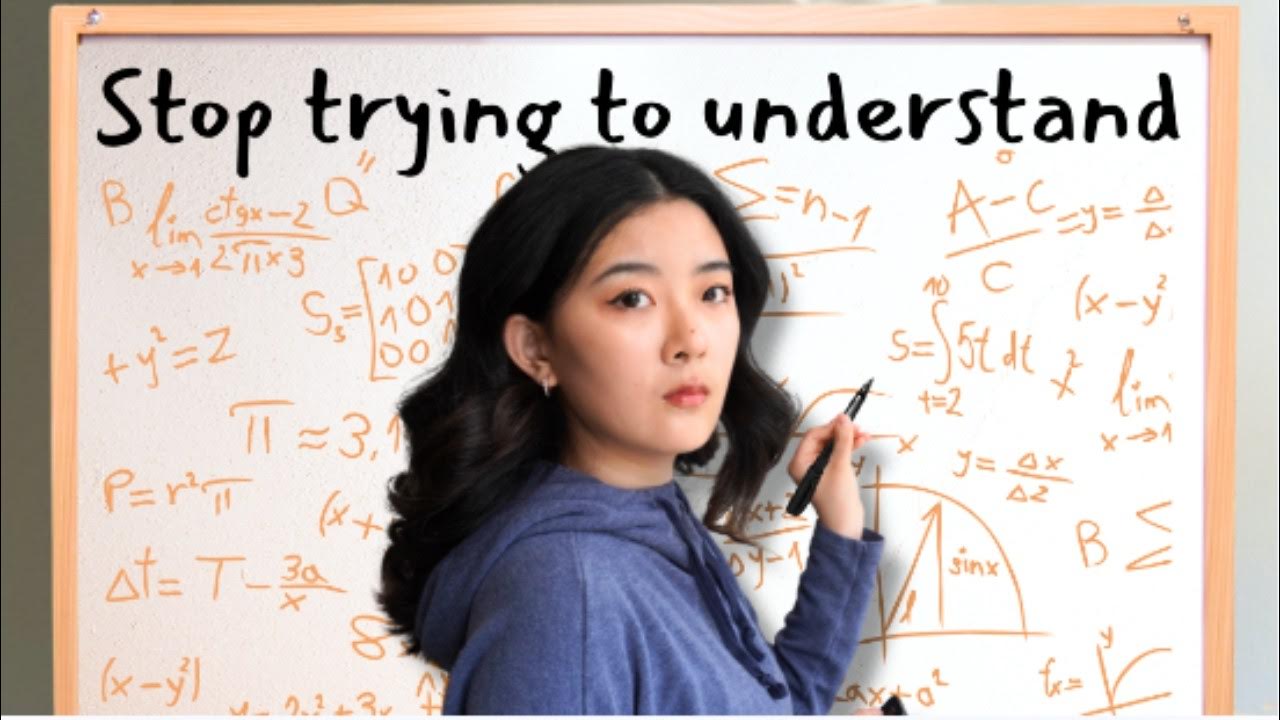Why you understand the math but CAN'T solve problems
Summary
TLDRIn this video, Han, a Columbia University graduate, shares her journey from struggling with math to mastering it. She emphasizes the importance of active learning over passive learning, explaining that understanding concepts is not enough; practice is crucial. Han provides actionable tips to improve math skills, such as redoing questions until correct and using the Feynman technique to ensure deep understanding. She also addresses common issues like memorization, problem-solving tricks, and common mistakes, offering strategies to overcome them and enhance math performance.
Takeaways
- 📚 Han, the speaker, graduated from Columbia University and studied math and operations research, highlighting her credibility on the topic.
- 🔄 Han struggled with math in high school, receiving C's and D's, which shows that she overcame significant challenges in her math journey.
- 🤔 Han suggests that understanding math but not being able to solve questions correctly is a common issue among students.
- 📉 The motivation to practice math can fade with wrong answers, leading to frustration and the end of practice sessions.
- 🔍 Han emphasizes the difference between passive and active learning, stating that the latter is more effective for mastering math.
- 📈 Active learning involves doing something beyond just receiving information, such as discussions, practicing, and teaching others.
- 🚫 Passive learning, which includes listening to lectures and watching demonstrations, is less effective in math and science education.
- 🔄 Han recommends redoing questions independently when they are wrong, as understanding the solution is not enough.
- 💡 The 'Feynman Technique' is suggested as a method to improve understanding by explaining concepts as if to a child.
- 🧠 Active recall and spaced repetition are recommended for memorization, which is sometimes necessary in math.
- 🛠 Collecting and applying problem-solving tricks in a 'toolbox' can help with specific math tactics that are not commonly known.
- 🔍 Paying attention to common mistakes, such as calculation errors or misreading problems, is crucial for improvement.
Q & A
What is the main issue discussed in the video script?
-The main issue discussed is the struggle of understanding math concepts but not being able to solve math problems correctly, and the importance of active learning over passive learning.
Who is the speaker in the video script?
-The speaker is Han, a recent graduate from Columbia University who studied math and operations research.
What was Han's initial experience with math in high school?
-Han struggled with math in high school, often receiving C's and D's despite investing a lot of time and effort.
What is the difference between passive learning and active learning as described in the script?
-Passive learning involves receiving information from outside sources without internalizing it, such as listening to lectures or watching demonstrations. Active learning means being actively involved in the learning process, such as discussing, practicing, and teaching others.
Why is active learning more effective in math and science education according to the script?
-Active learning is more effective because it involves doing something beyond just receiving information, which helps in better understanding and applying math concepts.
What is the 'fan technique' mentioned by Han?
-The 'fan technique' is a learning method used by Richard Feynman, where one explains a concept as if to a child, which helps uncover areas of misunderstanding.
What should one do when they get a math question wrong according to the script?
-One should redo the question independently until they get it right, which is a form of active learning and helps in understanding where the mistake was made.
What are the four types of problems one might face when studying math as outlined in the script?
-The four types of problems are understanding problems, memorization issues, unfamiliarity with specific tricks or tactics, and making silly mistakes.
Why is memorization often unnecessary in math according to Han?
-Memorization is often unnecessary because everything in math can be proven, and understanding the concepts is more important than memorizing specific equations or steps.
What is the recommended technique for memorization when it is necessary?
-The recommended technique is active recall and spaced repetition, which involves actively trying to remember information and revisiting it over time to reinforce memory.
How can one prevent making silly mistakes when solving math problems?
-One can pay close attention to common mistakes, understand why they occur, and adjust their approach or writing style to avoid such errors in the future.
Outlines

This section is available to paid users only. Please upgrade to access this part.
Upgrade NowMindmap

This section is available to paid users only. Please upgrade to access this part.
Upgrade NowKeywords

This section is available to paid users only. Please upgrade to access this part.
Upgrade NowHighlights

This section is available to paid users only. Please upgrade to access this part.
Upgrade NowTranscripts

This section is available to paid users only. Please upgrade to access this part.
Upgrade NowBrowse More Related Video

Becoming good at math is easy, actually

The math study tip they are NOT telling you - Ivy League math major

5 simple study habits that helped me MASTER math

Become good at Math in 9 mins: How to self-study Math easily

Meet Savannah Treviño-Casias, College Student With Dyscalculia

Learning How to Learn: A MIND FOR NUMBERS by Barbara Oakley | Core Message
5.0 / 5 (0 votes)